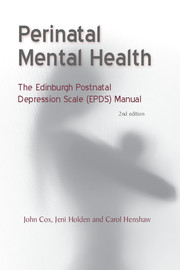Book contents
- Forntmatter
- Contents
- The authors
- Acknowledgments
- Abbreviations
- List of Figures
- Foreword
- Preface to the First Edition
- Preface to the Second Edition
- 1 Postnatal Depression: An Overview
- 2 The Origins and Development of the Edinburgh Postnatal: Depression Scale
- 3 International and Cross-Cultural Issues
- 4 Using the Edinburgh Postnatal Depression Scale in Clinical: Settings: Research Evidence
- 5 Humanistic and Person-Centred Interventions in Perinatal Depression
- 6 Screening and Intervention Services in the Community
- 7 Using the Edinburgh Postnatal Depression Scale
- Appendix 1 The Edinburgh Postnatal Depression Scale
- Appendix 2 Translations of the Edinburgh Postnatal Depression Scale
- References
- Index
6 - Screening and Intervention Services in the Community
Published online by Cambridge University Press: 05 February 2021
- Forntmatter
- Contents
- The authors
- Acknowledgments
- Abbreviations
- List of Figures
- Foreword
- Preface to the First Edition
- Preface to the Second Edition
- 1 Postnatal Depression: An Overview
- 2 The Origins and Development of the Edinburgh Postnatal: Depression Scale
- 3 International and Cross-Cultural Issues
- 4 Using the Edinburgh Postnatal Depression Scale in Clinical: Settings: Research Evidence
- 5 Humanistic and Person-Centred Interventions in Perinatal Depression
- 6 Screening and Intervention Services in the Community
- 7 Using the Edinburgh Postnatal Depression Scale
- Appendix 1 The Edinburgh Postnatal Depression Scale
- Appendix 2 Translations of the Edinburgh Postnatal Depression Scale
- References
- Index
Summary
The consequences of maternal depression are costly not only on a personal level, but also in terms of health service resources, including money as well as personnel. It is important therefore that services should be relevant, targeted and research-based. The fact that women's contact with health professionals is at a peak around the time of childbirth provides an ideal opportunity for intervention and for ensuring that these contacts are used with maximum efficiency to meet the needs of individual women.
In this chapter we discuss the argument for introducing the EPDS in healthcare settings. Information was derived from research and from training groups of health professionals from different disciplines (including psychologists, psychiatrists family doctors, community psychiatric nurses, midwives and health visitors) for the introduction of postnatal depression initiatives. Discussions during training and post-training feedback added to our knowledge of the practical issues of administering the EPDS.
Following our original EPDS and counselling intervention research (Cox et al, 1987; Holden et al, 1989), training was requested by health authorities in England, Scotland, Northern Ireland and Ireland and many primary care trusts introduced routine EPDS screening and intervention programmes. In 2002, the SIGN Development Group carried out a survey of EPDS practice (Scottish Intercollegiate Guidelines Network, 2002). SIGN found that EPDS screening was undertaken routinely in all but one primary care trust area in Scotland. They recommended the use of the EPDS as a screening tool, but the document also pointed out that:
‘the routine use of the EPDS carries significant implications associated with training, health visitor time for screening and intervention, and facilities in general practice and secondary care for treatment.’ (p. 17)
The routine screening debate
It has been suggested that administering the EPDS with all postnatal women is both unnecessary and intrusive (Shakespeare, 2002), and that experienced health professionals who are in frequent contact with their patients should be able to detect depression without such an aid (Barker, 1998). In 2009, Paulden and colleagues evaluated several screening measures for postnatal depression (including the EPDS) to determine their value within the NHS.
- Type
- Chapter
- Information
- Perinatal Mental HealthThe EPDS Manual, pp. 60 - 67Publisher: Royal College of PsychiatristsPrint publication year: 2014

